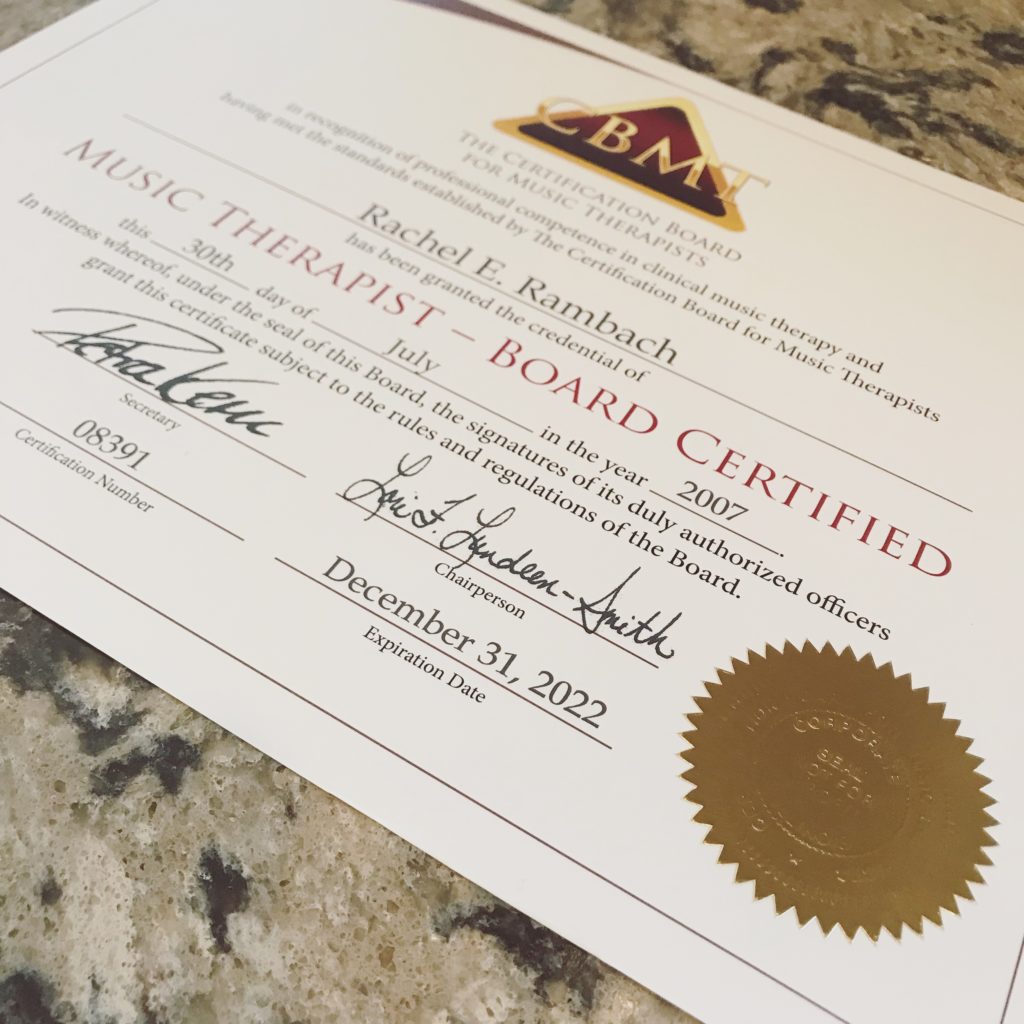
The moment I found out I passed my board certification exam was glorious. It was as if the entryway into the profession of music therapy had finally been unlocked and I was free to enter.
Even as a beginning music therapy student, I remember being so inpatient. I was eager to have my own clients but often felt bogged down with all the requirements that I had to complete in order to get certified. I didn’t see it back then, but looking back, I see that that the time that I wished would pass by so quickly was put in place so that I could train, make mistakes, learn from those mistakes, repeat the lessons learned, and build confidence.
I’m thankful that these steps exist because not only did it prepare me to enter the workforce, but it also provided my future clients with the assurance that they would consistently receive quality care.
So what exactly are the steps that music therapists take to become board-certified?
All music therapists must complete an approved degree in music therapy, whether it is at the bachelor’s, master’s or doctorate level. After the degree is completed, the next step is to complete an approved internship. After completing internship, the aspiring music therapist is then eligible to sit for the national board certification exam.
After passing the exam, he or she may use the credential “MT-BC” (Music Therapist-Board Certified). Once a music therapist is board-certified, he or she must continue to develop professionally and maintain the ethical and professional standards of the profession.
What happens if I encounter an individual who uses music to help others but does not hold the MT-BC credential?
Music therapy services provided by individuals who do not hold the MT-BC credential have not successfully completed the steps mentioned above, therefore posing great risk of potential harm to their clients and community. To understand why music therapy services might be provided by a non-credentialed in the first place, it is important to consider these factors:
- Misrepresentations of music therapy
Often times the term “music therapy” may not be used in the context of an evidence-based health profession that involves a relationship with a credentialed therapist. Rather, it is often mistakenly used as casual term to label a genre of relaxing music or products related to music and relaxation. When the public is misled to believe that music therapy is just the act of listening to a YouTube video titled “Music Therapy”, it creates confusion as to what board-certified music therapists actually do.
- Related music professions that are similar but not interchangeable with music therapy
Related music professionals, including musicians who perform in hospitals and volunteer musicians who sing in nursing homes, can use music to help others. While it may look like a therapeutic relationship exists between the musician and the client, only a board-certified music therapist is trained to incorporate evidence-based music activities to accomplish individualized goals, study the effect of music on clients, and promote measurable changes in behavior or function.
- Currently, most states do not have regulatory legislation in place at the state level to prevent unqualified individuals from offering music therapy services
Many music therapists are involved in the process of becoming state recognized. This may involve informing legislators of the benefits of music therapy and asking them to pass legislation that involves some or all of the following:
- Protecting the public and vulnerable populations (eg. persons with intellectual or emotional disabilities, or persons coping with physical, mental, or terminal illness) from un-credentialed professionals that may inappropriately use music and cause potential physical, psychological or emotional harm
- Facilitating greater access to music therapy. Agencies and health care providers may be more likely to include music therapy as a service option if music therapy becomes a state recognized and licensed profession. This would help music therapists provide services to more facilities and agencies and would give the public better access to choose music therapy as part of their treatment
What now?
Now that I’ve gone through the whole process of becoming nationally certified, I can appreciate the weight of what I do. Music therapy is an amazing profession that involves rigorous training and the opportunity to make a positive change in other people’s lives. As a board-certified music therapist, I can now be a part of a community of professionals that is passionately dedicated to the well being of their clients.
For the student music therapist, that journey may look like committing to do your best in the daily grind of studying; to the new professional, it may look like researching ways to become more active in supporting music therapy in your community; and for others, it may even look like actively talking with legislators and asking them to create licensure for music therapists in their state.
Wherever you may be, don’t be afraid of taking ownership of your profession. Don’t be afraid to ask yourself how you can continue to grow as a professional, and always remember that what you do matters!



I am a piano teacher looking forward become a music therapist.